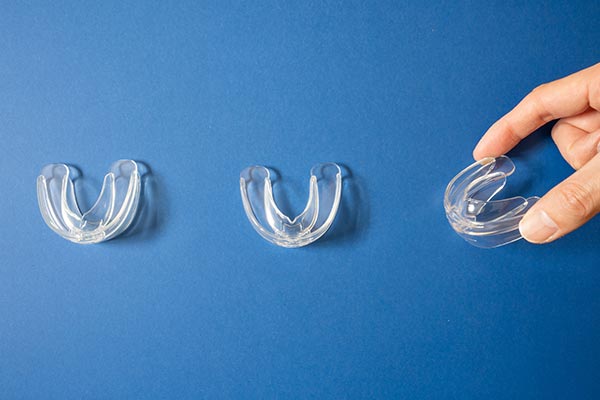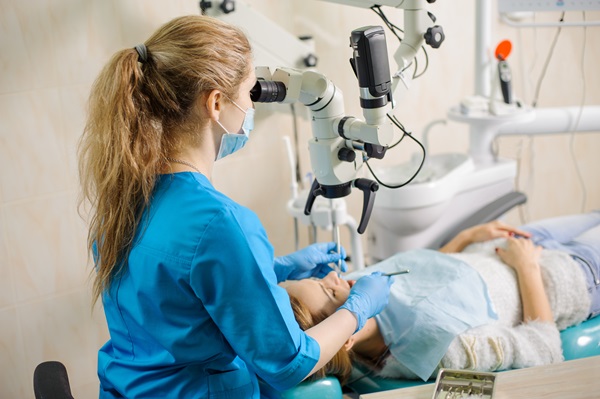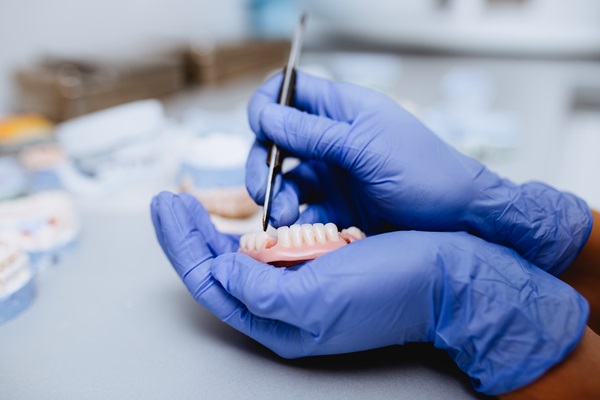When You Need a Mouthguard From a General Dentist
 A general dentist may recommend a mouthguard to protect the teeth from damage that can occur from teeth grinding, sports injuries, or physically strenuous jobs. Grinding can be difficult to treat, but a patient can be helped by a thin mouthguard on the upper or lower teeth to prevent friction from occurring. Other types of mouthguards, such as those made for contact sports, keep the teeth and surrounding soft tissues safe during tackles and falls.
A general dentist may recommend a mouthguard to protect the teeth from damage that can occur from teeth grinding, sports injuries, or physically strenuous jobs. Grinding can be difficult to treat, but a patient can be helped by a thin mouthguard on the upper or lower teeth to prevent friction from occurring. Other types of mouthguards, such as those made for contact sports, keep the teeth and surrounding soft tissues safe during tackles and falls.
Over-the-counter mouthguards versus custom mouthguards
Mouthguards are available without a prescription or a dentist’s appointment, but these generic models will likely not fit the patient's mouth perfectly. Dental appliances that are not custom-made may cause chafing, mouth sores, and an overall feeling of discomfort for the patient. Over-the-counter guards may suffice as a temporary protective appliance for the teeth, but patients who suffer from moderate to severe bruxism or who need a more comfortable guard for long hours of sports practice can benefit from talking to a general dentist about being fitted for a quality mouthguard that will last for years.
Types of mouthguards general dentists can prescribe
While mouthguards can be crafted to fit over a patient’s top or bottom teeth, the style, thickness, and material is decided upon by the general dentist. The dentist collaborates with the patient to decide which type of guard is the most appropriate.
Mouthguards for those with medical concerns
Patients who suffer from tooth grinding, or bruxism, may contend with frequent headaches as well as jaw soreness and stiffness. While bruxism patients may think that these uncomfortable and often painful symptoms are a fact of life, many are not aware that teeth grinding can lead to more severe concerns like temporomandibular joint pain and cracked teeth. Grinding is unlikely to permanently damage teeth in the short term, but if the friction continues over weeks or years, tooth enamel and even the teeth themselves can be worn down.
Patients who are at higher risk for damaging teeth as a result of bruxism may be prescribed a thicker guard than those who have a milder form of the condition. These mouthguards can be worn at any time of day, but they are most often worn at nighttime when grinding cannot be consciously controlled.
Mouthguards for athletes
Individuals who play sports with a high risk of injury, such as football, hockey, basketball, and boxing, can benefit from wearing a mouthguard. This type of guard is designed to protect the tongue, inner cheeks, lips, and gums as well as the teeth during intense periods of physical activity. Sports mouthguards are generally bigger than nightguards as they are designed to safeguard against dental trauma. Younger athletes may be interested to know that sports mouthguards often come in a range of colors.
Conclusion
Dental appliances have a reputation for being bulky and irritating to wear; however, custom guards can be sculpted to provide maximum comfort for the patient. Consult with a general dentist to ascertain whether a mouthguard is the right choice for your lifestyle and dental needs.
Request an appointment or call Lida Davani, DDS at 310-402-2149 for an appointment in our Los Angeles office.
Related Posts
In recent years, more patients have been asking general dentist professionals about straighter teeth. Orthodontic treatment has come a long way in the last decades. Patients may think that traditional braces are the only option, but clear aligners and appliance therapy are also available now. When having this conversation, it is important that patients discuss…
Good oral care is critical for overall well-being, and adults who routinely visit a general dentist are less likely to have problems with their teeth and health. Visiting a dentist twice per year can help detect and remediate the following conditions: CavitiesGum diseaseOral cancerTooth misalignmentSystemic diseaseMany people put off visiting a dentist due to fear…
When a patient has a cavity, a general dentist thoroughly takes out all the decayed area of the tooth and replaces it with a filling in the empty space to prevent future decay. When it comes to the type of filling, there are various options from which the patient may choose. They each have advantages…


